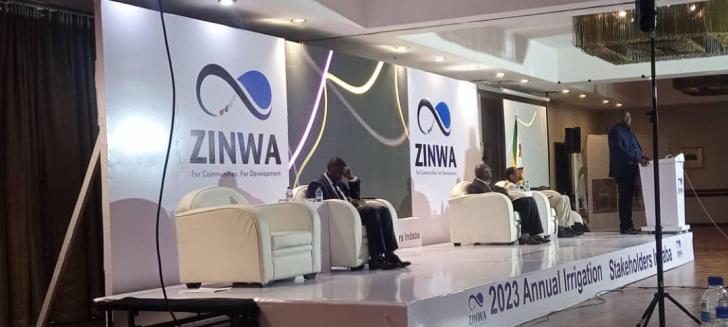News / National
Zinwa loses bid to block arbitrator in debt row
19 Nov 2024 at 08:53hrs |
0 Views

The High Court has rejected an application by the Zimbabwe National Water Authority (Zinwa) to set aside an arbitration ruling in a case where the authority is accused of refusing to pay a service provider.
Zinwa had sought to block the arbitration award issued by arbitrator Tecla Mapota in May, arguing that she did not have jurisdiction over the matter. The authority had approached the High Court seeking an order to dismiss the arbitrator's ruling, naming Pellavin Marketing and Mapota as the first and second respondents, respectively.
The case stems from a business transaction between Zinwa and Pellavin Marketing in January 2022 for the supply of branding services. The terms of the agreement between the parties included an arbitration clause, but the written agreement was never signed by Zinwa despite Pellavin Marketing sending it for signature in June 2022. Pellavin Marketing subsequently provided the services, but when Zinwa refused to pay, the matter was taken to arbitration.
Zinwa argued that Mapota lacked jurisdiction to hear the dispute, claiming the contract was not finalized. However, Mapota ruled in May that she did have jurisdiction, stating that Zinwa had waived its right to raise objections after failing to respond to the preliminary challenge.
Zinwa, dissatisfied with the ruling, approached the High Court seeking to overturn Mapota's decision. The authority argued that the arbitration clause in the unsigned agreement was not enforceable because the contract was still in the negotiation phase. Pellavin Marketing, however, insisted that a valid contract existed and that services had been rendered in line with its terms. The company also supported Mapota's decision, arguing that Zinwa had forfeited its right to challenge her jurisdiction.
In a ruling delivered by Justice Faith Mushure, the court dismissed Zinwa's arguments. Justice Mushure found that Mapota's ruling was legally sound, emphasizing that Zinwa had not denied the existence of a written agreement that included an arbitration clause. The judge noted that the absence of a signature does not invalidate the agreement, nor does it automatically imply that no contract existed.
"While the agreement was unsigned, the surrounding circumstances and the parties' prior dealings could give rise to the presumption that the unsigned terms represented their true intention," Justice Mushure said. "The absence of a party's signature does not per se invalidate the contract, nor does it automatically conclude that no contract was concluded."
The judge also highlighted that Zinwa had accepted that some services were rendered and that there was no legal basis for arguing that the parties were still negotiating the terms of the agreement. Justice Mushure concluded that Mapota's decision was not in violation of public policy and could not be faulted.
As a result, the High Court upheld Mapota's ruling, ordering Zinwa to pay costs for the trial. The decision reinforces the enforceability of arbitration clauses in contracts, even in the absence of formal signatures, and emphasizes the importance of adhering to legal procedures in contractual disputes.
Zinwa had sought to block the arbitration award issued by arbitrator Tecla Mapota in May, arguing that she did not have jurisdiction over the matter. The authority had approached the High Court seeking an order to dismiss the arbitrator's ruling, naming Pellavin Marketing and Mapota as the first and second respondents, respectively.
The case stems from a business transaction between Zinwa and Pellavin Marketing in January 2022 for the supply of branding services. The terms of the agreement between the parties included an arbitration clause, but the written agreement was never signed by Zinwa despite Pellavin Marketing sending it for signature in June 2022. Pellavin Marketing subsequently provided the services, but when Zinwa refused to pay, the matter was taken to arbitration.
Zinwa argued that Mapota lacked jurisdiction to hear the dispute, claiming the contract was not finalized. However, Mapota ruled in May that she did have jurisdiction, stating that Zinwa had waived its right to raise objections after failing to respond to the preliminary challenge.
Zinwa, dissatisfied with the ruling, approached the High Court seeking to overturn Mapota's decision. The authority argued that the arbitration clause in the unsigned agreement was not enforceable because the contract was still in the negotiation phase. Pellavin Marketing, however, insisted that a valid contract existed and that services had been rendered in line with its terms. The company also supported Mapota's decision, arguing that Zinwa had forfeited its right to challenge her jurisdiction.
In a ruling delivered by Justice Faith Mushure, the court dismissed Zinwa's arguments. Justice Mushure found that Mapota's ruling was legally sound, emphasizing that Zinwa had not denied the existence of a written agreement that included an arbitration clause. The judge noted that the absence of a signature does not invalidate the agreement, nor does it automatically imply that no contract existed.
"While the agreement was unsigned, the surrounding circumstances and the parties' prior dealings could give rise to the presumption that the unsigned terms represented their true intention," Justice Mushure said. "The absence of a party's signature does not per se invalidate the contract, nor does it automatically conclude that no contract was concluded."
The judge also highlighted that Zinwa had accepted that some services were rendered and that there was no legal basis for arguing that the parties were still negotiating the terms of the agreement. Justice Mushure concluded that Mapota's decision was not in violation of public policy and could not be faulted.
As a result, the High Court upheld Mapota's ruling, ordering Zinwa to pay costs for the trial. The decision reinforces the enforceability of arbitration clauses in contracts, even in the absence of formal signatures, and emphasizes the importance of adhering to legal procedures in contractual disputes.
Source - newsday
Join the discussion
Loading comments…


































